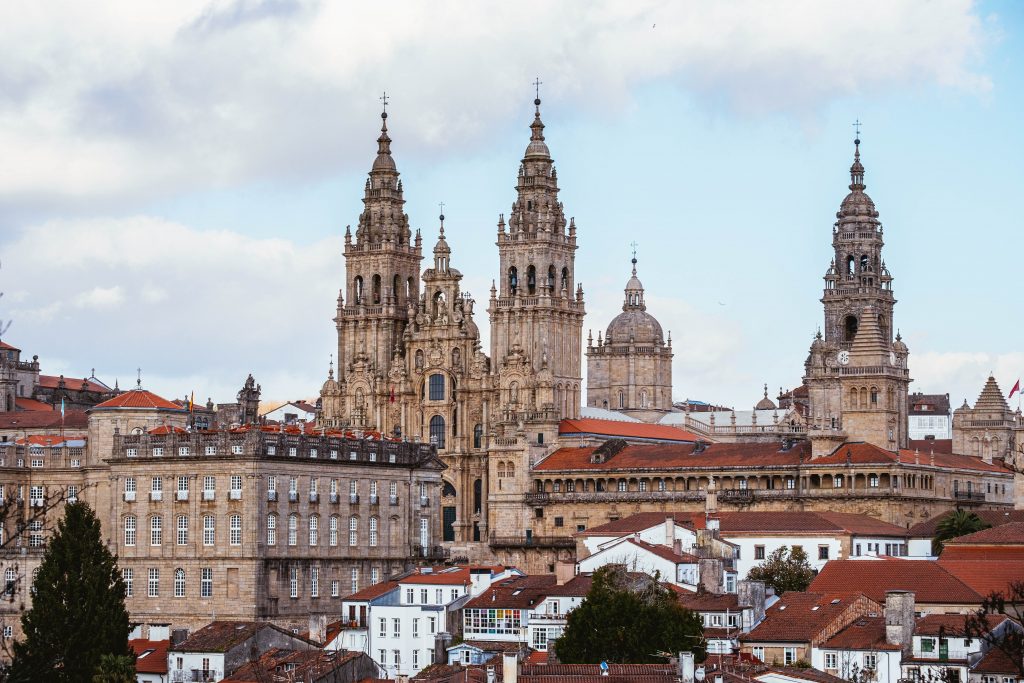
Historia I: Los peregrinos de hoy, los vagabundos del pasado/ Story no. I: Today’s pilgrims, the vagabonds of the past
?? Los peregrinos de hoy, los vagabundos del pasado
Una señora de ochenta años recuerda su infancia y nos está contando la perspectiva que el pueblo compartía con respecto a los peregrinos en esa altura. Describe cómo, con diez años ya, en el camino de su casa para repartir la leche a las señoras de Tuy antes de irse a la escuela, se encontraba de vez en cuando con algún peregrino.
“Me acuerdo que los peregrinos pasaban hoy uno, mañana otro, o por la tarde otro… Pero era uno cada día o cada noche y la gente decía que era un “rufino”. Lo decían con desprecio, pero la cosa fue evolucionando y empezó a venir la gente. De aquella nosotros los considerábamos como vagabundos.”
Los peregrinos se consideraban unas personas vagabundas, como si fueran pobres, porque no se sabía que era una peregrinación religiosa.
“Por aquel entonces no (se sabía); ellos sí que lo sabían, pero la gente que los veía no. Ellos iban de peregrinación, ellos sabían lo que hacían, pero nosotros no.”
Se cuenta cómo se iban “Con aquellas capas, vestidos” y que la gente se preguntaba “¿dónde irán?”, pero no estaban en contacto con ellos.
“Nadie les hacía caso”
-Ya te digo porque antes los peregrinos también iban pidiendo para que les dieran de comer
-Claro irían a lo justo, pero yo no hablo de eso, yo antes venía a Tui a dejar la leche y me marchaba, y los veía sentados en una puerta, no los veía pedir.
¿Qué hizo que la gente cambiara de opinión con respecto a los peregrinos, según los lugareños?
Que en los años venideros, los medios de comunicación (principalmente la radio así como las noticias difundidas en el cine antes de la proyección de la película) brindaron mayor información y difusión sobre lo que es la peregrinación. Esta explicación provocó el cambio de actitud hacia los peregrinos; un cambio que hoy en día es cada vez más capitalizado y comercializado.
?? Contemporary pilgrims, the vagabonds of the past
An eighty-year-old lady remembers her childhood and she is describing the perspective that the town shared regarding the pilgrims in those days. She describes how, on her way from home to distribute the milk to the ladies of Tuy, she would encounter every now and then some pilgrim:
I remember that one would pass by, another tomorrow, or another in the afternoon, the pilgrims, but there was one every day or every night and people said he was a “rufino”, a vagabond. They said it with contempt… Yet things evolved and more people started coming. However, at that time we considered them as vagabonds.
Pilgrims were considered as vagabonds, as if they were poor, because the masses were not familiar with the concept of pilgrimage.
“At that time no (pilgrimage was not known). They went on pilgrimage, they knew what they were doing; we didn’t.”
It is recalled how they left “dressed in those capes” and that people wondered “where would they be going?”, yet no one was in contact with them.
“No one paid attention to them”
-I already told you because before the pilgrims were also asking to be fed
-Of course they would go to the right thing, but I don’t talk about that, I used to come to Tui to leave the milk and I left, and I saw them sitting in a door, I didn’t see them asking.
What made people change their minds about pilgrims, according to locals?
According to the locals, in the years to come, the media (mainly the radio as well as the news broadcast in the cinema before the screening of the film) provided more information and dissemination about what pilgrimage is. This explanation caused the change of attitude towards the pilgrims; a change that today is increasingly capitalized and marketed.
- Voluntario/a
- Camino Portugués


